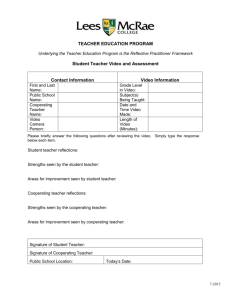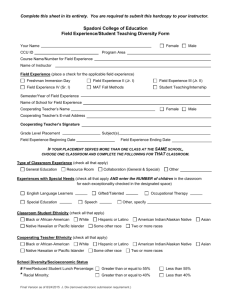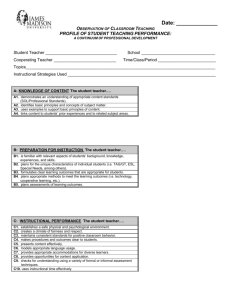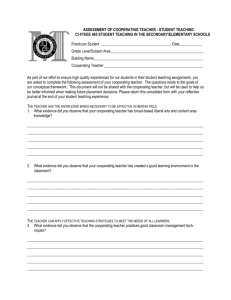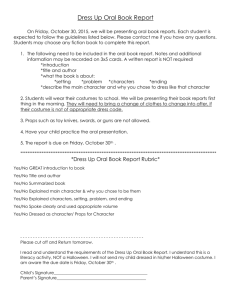PROFESSIONALISM - CSUSM Single Subject Program
advertisement
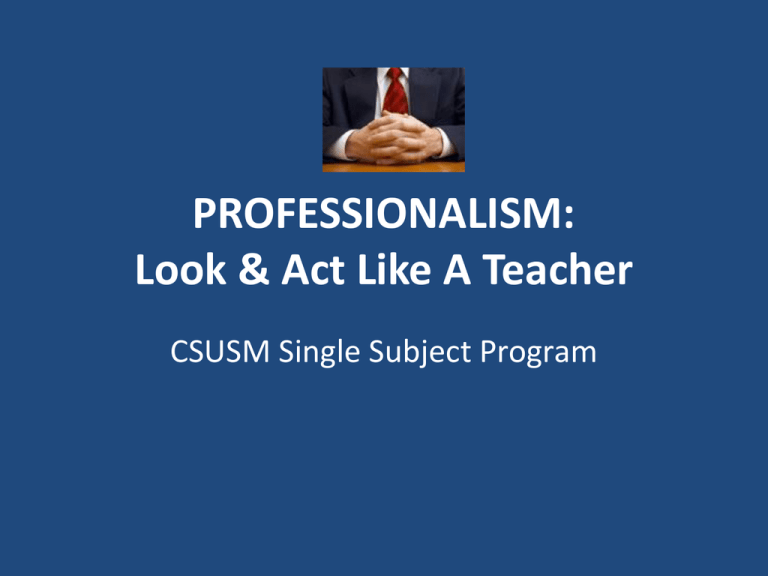
PROFESSIONALISM: Look & Act Like A Teacher CSUSM Single Subject Program WHAT ADVICE WOULD YOU GIVE? A colleague sits next to you. She is wearing jeans, tank top and sandals. She starts to complain, “I am not enjoying my clinical practice. My cooperating teacher is okay, but the students are so disrespectful. I can’t get them to listen to me. They keep going to the cooperating teacher like I am not even there. I have tried to be their friend. I think I am going to have to be mean, but it is not my nature. One student is so bold he flirts with me. Often he smiles and licks his lips. Yesterday he touched the back of my neck.” CLINICAL PRACTICE - STUDENT TEACHING • 3+ Month Long Interview • Small Educational Community You never know who may know whom. • You only want to give people good reasons to remember you. PROFESSIONALISM • DRESS, HABITS, ATTENDANCE, ETC. • APPROPRIATE DEMEANOR WITH STUDENTS Finding a balance between caring, being friendly, and exercising your role as the adult in charge…all while building mutual respect • PREPARATION Lesson plans must be completed ahead of time and reviewed with your cooperating teacher to ensure developmental appropriateness and curricular relevance. • PROFESSIONAL DEVELOPMENT What do you have to do to impress? Go beyond the bare minimum. Attend staff meetings, in-service sessions, parent conferences, etc. See the checklists in the Single Subject Program Handbook. Clinical Practice Activities Single Subject Handbook • • • • • • • • • • • • • • • • Participate in parent conferences Attend Parent-Teacher-Student Association meeting, Attend school board meeting Contact parents (via phone, mail, home visits) Participate in community activities Plan an “event” (e.g. field trip) Experience a class dedicated to special populations (e.g. special education, alternative special day class, primary language) Lead an advisor/homeroom/club experience Attend professional development training (conferences, etc.) Supervise/observe extracurricular or non-instructional activities (lunch, intramurals, student activities) Attend staff/departmental meeting Attend teacher association (union) meeting Participate in business partnership/activity Attend Bilingual Parent Advisory Committee meeting Participate in a lab (technology lab, computer lab, writing lab, etc.) Attend/observe an Individualized Education Program (IEP) meeting DRESS "Dupree is a slender, attractive African American woman. She is always impeccably dressed in a style that reminds one of a corporate executive. Her outfits always are coordinated; she seems to have a different pair of shoes for each. During our first interview she said that the girls in her class sometimes peek around the classroom door in the morning to see what she is wearing. When one of her students asked why she was always 'so dressed up,' Dupree replied that she dressed the way she did because she was coming to work and she worked with very important people, so she wanted to look good." (The Dreamkeepers, Ladson-Billings, 1994, p. 35) What message is Gloria Ladson-Billings sending teachers? HOW DO YOU WANT TO BE PERCEIVED? Research indicates that a teacher’s image affects how professional a teacher is viewed (Underwood, Kenner & McCune, 2002) http://64.233.169.104/search?q=cache:aAznolqoSNkJ:www.hiceducation.org/Edu_Proc eedings/Rachel%20Underwood.pdf+professional+dress+teachers&hl=en&ct=clnk&cd=9 &gl=us&client=safari DRESS TO IMPRESS • Differentiate yourself from students • Look for professionally dressed mentors to model yourself after • Remember that you are on an extended interview ATTIRE TO AVOID HOW WOULD YOU RESPOND? • My cooperating teacher doesn’t dress up. • I want to fit in, so shouldn’t I wear what my cooperating teacher wears? • You look nice today, is there something special happening today? • Your dressing up, is making the rest of us look bad. • Your teaching is more important than your clothes. APPROPRIATE DEMEANOR W/STUDENTS Finding a balance between • Caring • Being friendly • Exercising your role as the adult in charge …all while building mutual respect PREPARATION • Lesson plans must be completed ahead of time and reviewed with the cooperating teacher to ensure developmental appropriateness and curricular relevance. PROFESSIONAL DEVELOPMENT • What do you have to do? • Go beyond the bare minimum. • Attend staff meetings, inservice sessions, parent conferences, board meetings, etc. See the checklists in the Single Subject Program Handbook for ideas. Bulletproof Your Job: Simple Strategies to ride out tough times & come out on top at work (Steven Viscusi, 2009) • • • • • • Get along with your boss & colleagues Dress Upward: Always look as good as you can Create a network of mentors Be punctual Don’t abuse sick days Create the perception that you are always there and ready to work NOW … HOW WOULD YOU RESPOND? A colleague sits next to you. She is wearing jeans, tank top and sandals. She starts to complain, “I am not enjoying my clinical practice. My cooperating teacher is okay, but the students are so disrespectful. I can’t get them to listen to me. They keep going to the cooperating teacher like I am not even there. I have tried to be their friend. I think I am going to have to be mean, but it is not my nature. One student is so bold he flirts with me. Often he smiles and licks his lips. Yesterday he touched the back of my neck.” Remember… • • • • • We don’t expect you to know everything. Ask questions. Ask for help if you need it. Put students first. Adolescents are fun – enjoy them.
